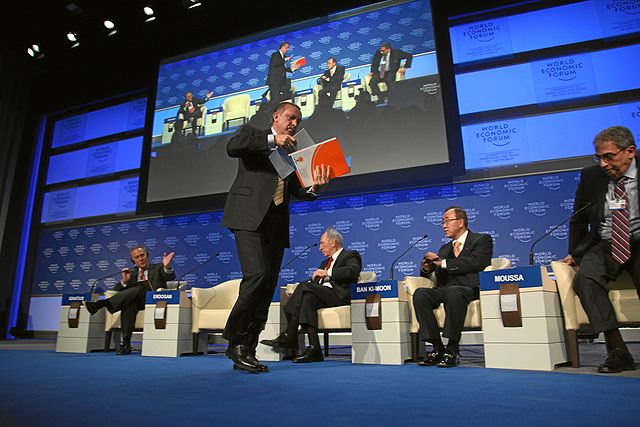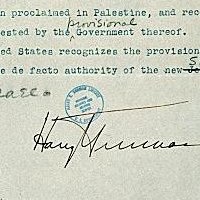![]()
Sat, Nov 05, 2011 | WikiLeaks

Recep Tayyip Erdogan, Prime Minister of Turkey leaves the session, while David Ignatius (FLTR), Associate Editor and Columnist, The Washington Post, USA, Shimon Peres, President of Israel, Ban Ki-moon, Secretary-General, United Nations, New York, Amre Moussa, Secretary-General, League of Arab States, Cairo, look on, during the session 'Gaza: The Case for Middle East Peace' at the Annual Meeting 2009 of the World Economic Forum in Davos, Switzerland, January 29, 2009. (originally posted to Flickr as WORLD ECONOMIC FORUM ANNUAL MEETING 2009 - Recep Tayyip Erdogan. Copyright by World Economic Forum. Author: World Economic Forum; licensed under the Creative Commons Attribution-Share Alike 2.0 Generic license.)
WikiLeaks: Turkish-Israeli Relations Continue to Sour
Turkish-Israeli bilateral relations remain strained. GOT interlocutors attribute the tension to Israel’s December Gaza operation and argue that the bilateral relationship will recover only when Israel allows improvements to the humanitarian situation in Gaza. The GOT’s last-minute decision to exclude Israeli participation from the Anatolian Eagle joint military exercise further frayed ties, despite heroic efforts by the MFA, TGS, Israel, Italy, NATO, and us to make the best of a bad situation.
Another sore point is that FM Davutoglu has yet to visit Israel since his appointment in May, although he has visited many of the other countries in the region in that same time period. Plans for an October trip by the FM to Israel are still up in the air due to GOI concerns over his desire to also visit Gaza.
The Israeli Embassy here attributes the deterioration of the relationship exclusively to Prime Minister Erdogan. Meanwhile, military ties may also be weakening because of the decrease in senior-level visits. With each side expecting the other to make the first move, there is little prospect for near-term improvements in Turkey-Israeli relations.
Source: WikiLeaks
Reference Created Classification Origin 09ANKARA1481 2009-10-14 13:35 CONFIDENTIAL Embassy Ankara
VZCZCXRO9885
PP RUEHROV
DE RUEHAK #1481/01 2871335
ZNY CCCCC ZZH
P 141335Z OCT 09
FM AMEMBASSY ANKARA
TO RUEHC/SECSTATE WASHDC PRIORITY 0963
INFO RUEHXK/ARAB ISRAELI COLLECTIVE
RUEAIIA/CIA WASHDC
RHEFDIA/DIA WASHDC
RHMFISS/HQ USCENTCOM MACDILL AFB FL
RHMFISS/EUCOM POLAD VAIHINGEN GE
RUEKJCS/JOINT STAFF WASHDC//J-3/J-5//
RUEKJCS/SECDEF WASHDC//USDP:PDUSDP/ISA:EUR/ISA:NESA/DSCA//
RHEHAAA/NSC WASHDC
RUEUITH/ODC ANKARA TU
RUEUITH/TLO ANKARA TU
RUEHAK/USDAO ANKARA TUC O N F I D E N T I A L SECTION 01 OF 03 ANKARA 001481
SIPDIS
DEPARTMENT ALSO FOR EUR/SE
E.O. 12958: DECL: 09/23/2019
TAGS: PREL PGOV PINR TU IS
SUBJECT: TURKISH-ISRAELI RELATIONS CONTINUE TO SOURREF: TEL AVIV 2245
Classified By: Ambassador James Jeffrey, for reasons 1.4(b,d)
¶1. (C) Summary: Turkish-Israeli bilateral relations remain
strained. GOT interlocutors attribute the tension to
Israel’s December Gaza operation and argue that the bilateral
relationship will recover only when Israel allows
improvements to the humanitarian situation in Gaza. The
GOT’s last-minute decision to exclude Israeli participation
from the Anatolian Eagle joint military exercise further
frayed ties, despite heroic efforts by the MFA, TGS, Israel,
Italy, NATO, and us to make the best of a bad situation.
Another sore point is that FM Davutoglu has yet to visit
Israel since his appointment in May, although he has visited
many of the other countries in the region in that same time
period. Plans for an October trip by the FM to Israel are
still up in the air due to GOI concerns over his desire to
also visit Gaza.¶2. (C) The Israeli Embassy here attributes the deterioration
of the relationship exclusively to Prime Minister Erdogan.
Meanwhile, military ties may also be weakening because of the
decrease in senior-level visits. With each side expecting
the other to make the first move, there is little prospect
for near-term improvements in Turkey-Israeli relations. End
Summary.GOT Still Angry Over Gaza
————————-¶3. (C) PM Erdogan felt betrayed by then Israeli PM Olmert,
when they met in Turkey just days before the start of
Israel’s Gaza operation last December, according to Ibrahim
Kalin, foreign policy advisor to the Turkish PM. Kalin
contended to us that Olmert had lied to Erdogan about Israeli
intentions in Gaza. Kalin said it is now the GOI’s
responsibility to reach out to Ankara. He said there is no
ideological barrier between the two countries, but that
Erdogan cannot overlook Olmert’s affront. Kalin pointedly
told us Israel must address the humanitarian situation in
Gaza and allow reconstruction to begin.¶4. (C) PM Erdogan has publicly complained about Israel at
international and domestic fora recently. Erdogan, while in
New York last month for UNGA, discussed Israel and Gaza on
multiple occasions. He complained to reporters that no one
talks about the issue of Israel’s possession of nuclear
weapons or its use of phosphorous weapons in Gaza, but
focuses on Iran’s possible development of nuclear weapons.
He also told them that there should be “accountability” for
anyone guilty of war crimes in Gaza. A portion of his speech
at UNGA focused on the Palestinian-Israel conflict with
special emphasis on the Gaza conflict. During his address to
his own Justice and Development Party’s (AKP) congress, he
again discussed Israel’s nuclear weapons and the poor
conditions in Gaza that, he claimed, were caused by Israel.
(Comment: Erdogan and the AKP’s rhetoric are likely an
effort to tap into strong popular Turkish sympathies for the
Palestinians. Erdogan’s hardline on Israel has also yielded
him points among Middle Eastern states, including Syria and
Iran. End Comment)Politics behind Anatolian Eagle Decision
—————————————-¶5. (C) The decision to exclude Israel from the Anatolian
Eagle joint military exercise came from senior-level Turkish
government officials only a week before the exercise was
scheduled to commence. The Turkish DCHOD told our Ambassador
that it was a political-level decision. Turkish MFA Israeli
Desk Officer Rauf Denktas said the GOT was concerned the
parliamentary opposition would condemn the government for
allowing the same Israeli air force that had bombed Gaza to
participate in the exercise. FM Davutoglu, in an interview
with CNN on Sunday, appeared to link openly the exclusion of
Israeli participation in the exercise to the lack of progress
in improving the situation in Gaza. However, the Turkish
Foreign Ministry said in statement on Monday that “is it
wrong to derive political meaning or conclusion fromANKARA 00001481 002 OF 003
postponing of the international part of the exercise.” It
also urged Israeli officials to use “common sense” in their
statements and attitudes with regard to the exercise
following Israeli officials’ claims in the press that Turkey
postponed the exercise after opposing Israeli participation.
Meanwhile, Israeli Deputy Foreign Minister Danny Ayalon was
cited by Turkish media as stating that Turkey should pay no
attention to reports in the Israeli media and “the
continuation of historic strategic relations between Turkey
and Israel is very important.Ӧ6. (SBU) In yet another development, pro-government papers
Wednesday began carrying an account that the GOT had nothing
to do with the decision, but rather it came from the Turkish
Air Force as retaliation for Israeli failure to provide Heron
UAVs Turkey has paid for. (Comment: While the Heron case is a
complicated mess, we give this tale little credence. End
Comment.)Senior Leadership Interaction Necessary
—————————————¶7. (C) Turkish-Israeli bilateral relations remain cool at the
senior level of both governments, and visits by high-level
Turkish officials are needed to return warmth to the
relationship, according to Israeli Embassy Spokesman Amit
Zarouk. He told us that the GOI has been encouraging a visit
by a high-level Turkish official for months and the two
countries have been negotiating a visit by Turkish FM
Davutoglu. According to Zarouk and Denktas, Israeli
President Peres has invited Davutoglu to present a speech at
Peres’s Presidential Conference in late October.¶8. (C) According to the Turkish MFA Israel desk officer and
an Israeli Embassy official, Davutoglu’s wish to also visit
the Palestinian Territories — including Gaza — has been a
key sticking point. Zarouk told us that, at first, the GOI
said it would tolerate Ramallah, but not Gaza. However,
Israel recently said that it would also accept the FM
visiting Gaza, under the condition he not cross from Israel.
He said the GOI fears that HAMAS would exploit Davutoglu’s
presence in Gaza for political and public relations purposes.
Ibrahim Kalin would not confirm that the visit would take
place, but told us that if the FM visits Israel, he will also
go to the West Bank and Gaza. He said that no matter what,
Israel will be involved in Davutoglu’s ability to visit Gaza
since the Israelis control the Rafah crossing in Egypt.
Denktas provided no concrete answer on the FM’s attendance at
the conference in Israel.¶9. (C) According to Zarouk, a Davutoglu visit could create
the goodwill necessary to move the relationship back on
track. (Note: According to normal protocol the Israeli FM is
due to visit Ankara, but it appears both sides are willing to
skip that visit. End Note.) Once Davutoglu goes to Tel
Aviv, it could clear the road for President Gul to reschedule
his own postponed trip. According to the Israeli Embassy,
the Israelis view these visits as necessary steps for Turkey
to take if it wants to regain Israel’s confidence.
Additionally, Zarouk said that regular communication between
the two Prime Ministers, currently nonexistent, would also go
a long way in restoring the bilateral relationship.¶10. (C) The Turkish and Israeli MFAs have maintained regular
contact and continue to hold consultations, according to our
Israeli and Turkish contacts. The Israeli Embassy’s
spokesperson told us that Israel has had difficulties getting
meetings outside the MFA. Israel has been unable to arrange
meetings with members of the Turkish Parliament or other
officers in ministries besides the MFA. Israeli Embassy
officials attribute their decline in contact with Turkish
government officials to the chilling effect PM Erdogan’s
hostility towards Israel has had on subordinates.Military Ties Damaged
———————¶11. (C) The Turkish-Israeli military bilateral relationship
has been a cornerstone of the strategic partnership, but
cracks may be appearing in these relations. The GOT’sANKARA 00001481 003 OF 003
withdrawal of Israel’s invitation to the Anatolian Eagle
exercise curtails regular interaction between the two air
forces. Turkey’s Deputy Chief of Staff GEN Aslan Guner told
the Ambassador on October 8 that he regretted deeply the
political decision to exclude Israel and that he understood
the U.S. decision to withdraw as well. He appreciated the
way that the U.S. sought to limit damage to the Turkey-Israel
relationship by stage managing a “postponement.” The Turkish
military values its relationship with Israel, as was
demonstrated in August 2009 during the joint Turkey-US-Israel
naval exercise “Reliant Mermaid.” Zarouk told us that the
GOI continues to wait for the Turkish CHOD to arrange his
long-awaited visit to Israel and the postponed January 2009
Strategic Dialogue meeting has yet to be rescheduled.
Denktas said that the Turkish military had no official visits
to Israel scheduled for the rest of the year, but indicated
that the two militaries are continuing their connections,
including two exercises planned for the last quarter of 2009.Comment
——-¶12. (C) A Davutoglu trip could jump start high-level
leadership interaction between the two nations. However, his
recent comments during a press conference in Syria calling
for the human tragedy in Gaza to end as soon as possible and
for Israel to pay attention to culturally and religiously
sensitive sites may weaken Davutoglu’s ability to improve
relations between the two countries. The restart of MEPP
negotiations may provide the next opportunity for Turkish
senior leadership to engage Israel if the Turkish FM does not
attend the Israeli President’s conference in late October. A
Turkish journalist told us that if the MEPP resumes,
Davutoglu would go to Israel because he would want to be
involved in the process. Turkey’s ties to Israel support its
claim to regional leadership and its assertion that it is
able to talk to all parties in its neighborhood. We will
continue to remind our Turkish interlocutors (although the
MFA does not need reminding) that Ankara is endangering its
aspiration to become the region’s mediator by allowing its
ties to Israel to attenuate. But, ultimately, the question
remains not so much whether Erdogan and Davutoglu want a
relationship with Israel, but rather, whether they are
willing to pay any price in compromise or concessions to
maintain one.JEFFREY
“Visit Ankara’s Classified Web Site at http://www.intelink.s
gov.gov/wiki/Portal:Turkey”



 RSS
RSS











WikiLeaks: Turkish-Israeli Relations Continue to Sour | Middle East, Israel, Arab World, Southwest A http://t.co/XMXtX9PN
#Wikileaks: Turkish-Israeli Relations Continue to Sour | Middle East … http://t.co/ynzS3KW4 #blog
WikiLeaks: Turkish-Israeli Relations Continue to Sour | Middle East, Israel, Arab World, Southwest A http://t.co/XMXtX9PN
WikiLeaks: Turkish-Israeli Relations Continue to Sour – http://t.co/Xug2r2LW